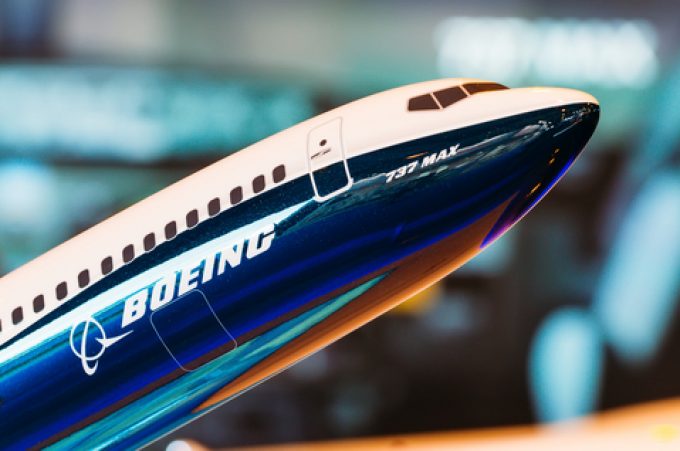Airfreight demand grows but 777F production logjam hobbles capacity
Boeing’s inability to deliver new 777-200 freighters is crimping carrier capacity to meet the strong ...

The turmoil over aviation safety has claimed the heads of Boeing chiefs and threatens to block the expansion plans of United Airlines, which is facing increased regulatory scrutiny.
After weeks of intense regulatory, as well as public, scrutiny, Boeing’s beleaguered CEO and president, Dave Calhoun, is on his way out. The plane-maker announced yesterday he would be retiring at the end of the year.
And he is not the only casualty in the boardroom: Boeing Commercial Airplanes president and CEO Stan Deal has been replaced by COO Stephanie Pope, with immediate effect, and is also going to retire; while Boeing board chair Larry Kellner will not stand for re-election.
Mr Calhoun, who took over the mantle of CEO after the manipulations around the MCAS system on the B737 Max came to light in the aftermath of two crashes that claimed the lives of 346 people, has not been able to turn around the company’s safety culture.
An audit by the FAA this month pointed to 97 instances when Boeing and supplier Spirit AeroSystems failed to comply with manufacturing control requirements – according to one report, Boeing failed 33 of 89 audits.
At a conference last Wednesday, Boeing CFO Brian West acknowledged that “for years we’ve prioritised the movement of the airplane through the factory over getting it done right, and that’s got to change.”
Observers and insiders have commented that the departures of the CEO and chairman would not be sufficient to change the culture at the plane-maker.
“The problems in Boeing’s executive suite are systemic. Nothing is going to change for the better without company leadership acknowledging their failures and thoroughly committing to fixing them,” the Society of Professional Engineering Employees in Aerospace said.
Its executive director, Ray Goforth, added: “The next CEO should be an aerospace engineer. This company thrived under engineering leadership for decades, but has lurched from crisis to crisis with MBAs running the company.”
Boeing’s plans to ramp-up output of the 737 Max have been curtailed by the FAA to a maximum of 38 a month. In addition, certification of the Max 10 model has been delayed, with no clear indication when this will be completed, which prompted United Airlines to tell Boeing to stop working on the model and deliver Max 9s instead.
According to Mr West, the repercussions from the safety problems will reflect a “negative 20%” in Boeing’s first-quarter result. He said the company would spend between $4bn and $4.5bn to address safety and manufacturing issues.
Some wags have called Mr Calhoun the best CEO Airbus ever had, but the European plane-maker’s leadership gave cause for concern over the fallout from its rival’s woes.
According to a report by Reuters, Boeing is looking to sever Spirit AeroSystem’s business with Airbus. Spirit Aero was split from Boeing two decades ago, to take cost off the latter’s balance sheet, but the recent struggles of the pair on the safety front have reinforced consideration of taking it back in-house.
Spirit Aero makes a fuselage section and wing spars for the A350 in North Carolina, wings for the A220 in Northern Ireland and wing parts in Scotland. Last year Airbus accounted for 19% of its revenue. A return to the Boeing fold would make for a rather awkward partnership.
Boeing and Airbus have not commented on the issue.
Meanwhile, the concerns about aviation safety are proving ominous for United Airlines beyond the delayed B737 Max 10 certification. Several incidents in recent weeks, including a United plane in Houston running off a taxiway, one of its B777s losing a tyre as it took-off from San Francisco and an emergency landing after flames erupted from a United plane’s engine while on its way to Florida.
On Saturday the FAA announced it was stepping up oversight of the airline’s compliance with safety regulations. And this may well be only the beginning of the airline’s issues with the authority.
According to a report citing sources with inside knowledge, the FAA is considering measures to clip United’s growth by preventing it adding new routes for which it has not yet started selling tickets. This would effectively pause the airline’s network expansion for an unspecified time. In addition, the FAA reportedly may bar United from carrying paying passengers on newly delivered planes.
In a memo to staff, Sasha Johnson, United’s VP of corporate safety, reportedly said the FAA was planning “to pause a variety of certification activities”. Apparently, the authority has suspended the airline’s ability to certify and promote pilots to fly new aircraft models.
It would not be altogether surprising if more safety issues were to come to light involving other airlines, prompting more regulatory scrutiny and brakes on expansion plans.
Comment on this article